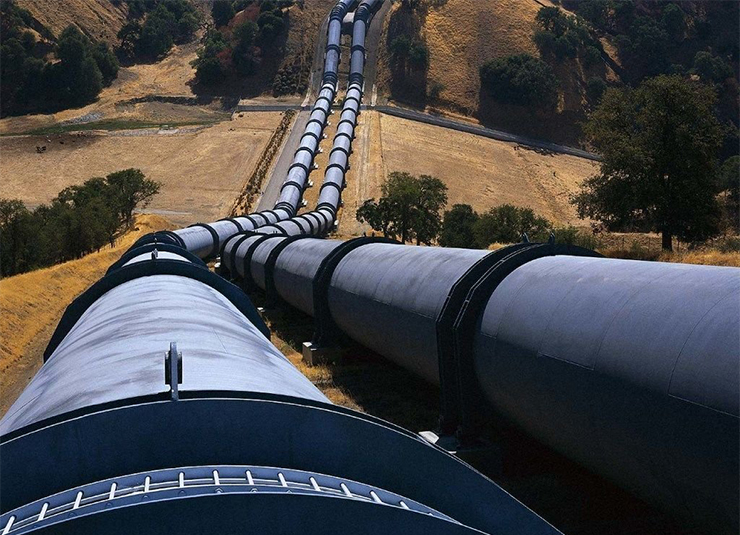Recently, Washington, in its expansionist attempts to aggressively promote its LNG on the European market and to limit the access of cheaper Russian gas to Europe, has increasingly forced its European satellites to advocate supplying gas from other countries than Russia. The Trans-Caspian Gas Pipeline is one of these US-backed options, and Washington has already repeatedly announced its support for it not only in the contacts with the European allies, but also with representatives of the current authorities of Azerbaijan and Turkmenistan, in order to actively involve the latter in the implementation of this project.
For many years, the five Caspian countries could not reach an agreement due to disagreements over pipelines, numerous disputed fields, water area demarcation etc.
With the signing of the Convention on the Legal Status of the Caspian Sea by Azerbaijan, Iran, Kazakhstan, Russia and Turkmenistan a year ago, which had been in development for more than 20 years, Turkmenistan and Azerbaijan stepped up their efforts to lay the Trans-Caspian Gas Pipeline. This was, to a great extent, the result of Washington’s efforts for pushing the project through. This, in particular, is confirmed by the content of the letter Donald Trump sent to the President of Turkmenistan via the new US Ambassador, retired Colonel Matthew S. Klimow, at the ceremony of presenting his credentials on June 25. The letter specifically notes Washington’s support for the possible prospects of Ashgabat’s gas export to the west through Azerbaijan by means of the Trans-Caspian Gas Pipeline.
Turkmenistan has repeatedly stated its willingness to diversify its gas export by exporting Turkmen natural gas to foreign markets, in particular, Europe. However, the delivery of Turkmen gas through the southern gas corridor requires a number of preliminary issues to be solved, i.e.: investment and price decisions, production/transport costs and gas purchase locations. In addition, the lack of firm political or financial support from abroad in the implementation of the Trans-Caspian Gas Pipeline so far has forced Turkmenistan to redirect its gas supply to China.
Ashgabat now believes that the Convention on the Legal Status of the Caspian Sea will make possible building the Trans-Caspian Gas Pipeline through the bottom of the Caspian Sea to Azerbaijan and connecting it to the Trans-Anatolian Natural Gas Pipeline (TANAP). This gas pipeline envisages the supply of gas from Azerbaijan via Georgia and Turkey to the Greek border, where it will be continued by the Trans-Adriatic Pipeline (TAP) to Southern Europe. Turkmen gas is also needed in Azerbaijan, as the Trans-Anatolian Natural Gas Pipeline will not operate at full capacity without it.
However, Iran, since it does not need a competing project, may claim several sections of the bottom through which the pipeline is supposed to run. As Behrouz Namdari, a representative of the National Iranian Gas Company (NIGC), said at the first Caspian Economic Forum in the suburbs of Türkmenbaşy after the signing of the Convention on August 12, “The construction of a gas pipeline from east to west of the Caspian Sea may cause severe damage to the region’s ecology… Iran is opposed to its construction.” The NIGC representative suggested that the neighbors use Iran’s gas transportation infrastructure. It cannot be ruled out that the recent significant aggravation of the confrontation between Iran and the West, caused by Washington, was a serious deterrent to Iran’ position on this project.
Although the first Caspian Economic Forum, which took place a year after the signing of the Caspian Convention, can be regarded as evidence of a new quality of interaction between the Caspian states, nevertheless, the hopes of Ashgabat for a possible revival of work on the Trans-Caspian Gas Pipeline have not yet come true.
In addition, there is another reason why the Trans-Caspian Gas Pipeline project is unlikely to be implemented in the near future: Turkmenistan, alleged leading gas supplier in this project, may not have enough natural gas reserves, while China, the main buyer of gas from Ashgabat, may block this project, as it is interested in purchasing Turkmen gas in the foreseeable future itself.
The Trans-Caspian Gas Pipeline, expected to be received in Europe in the near future, was supposed to become part of the southern gas corridor. However, for Turkmenistan’s participation in this project to be profitable, it must significantly increase the production, which is hardly likely without external investors, who prefer to take into account all the risks in this regard. In particular, they have many questions, the main being whether Turkmenistan is able to provide the necessary volume of gas supply to the Trans-Caspian Gas Pipeline alongside gas supply to India via the Turkmenistan-Afghanistan-Pakistan-India gas pipeline. Therefore, potential external investors are interested in objectively studying Turkmenistan’s actual natural gas reserves, but, so far, Ashgabat has not shown any willingness to disclose them.
Furthermore, the future of the Trans-Caspian Gas Pipeline today is marked by a certain decline in the interest on the part of individual European countries. This is due, in particular, to the fact that Italy has natural gas liquefaction capacities, so it can resolve the energy supply issue without buying Russian or Turkmen gas through the southern gas corridor by purchasing liquefied natural gas in Qatar. Similar capabilities exist in Spain and a number of other European countries as well. In other words, there is an alternative.
Valery Kulikov, expert politologist, exclusively for the online magazine ‘New Eastern Outlook’.

